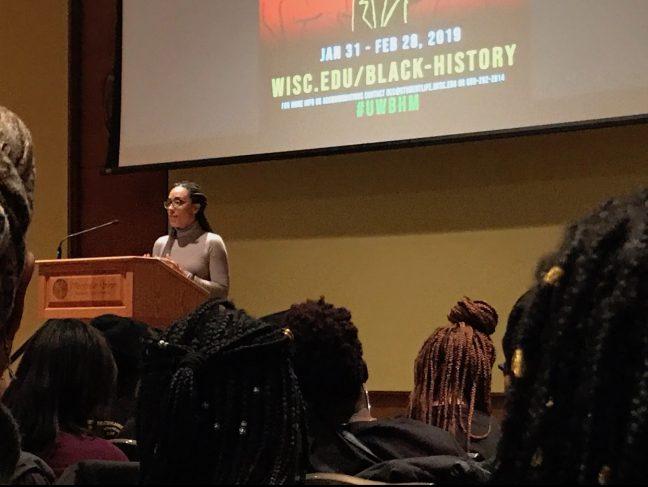The Black Cultural Center hosted political commentator Angela Rye Wednesday night to discuss the role of black students in society and on a predominantly white campuses.
Rye was brought to campus as part of Wisconsin Union Directorate’s Distinguished Lecture Series and her talk was one in a series of events for Black History Month.
Rye drew parallels between the Black Student Strike of 1969 and their 13 demands for the University of Wisconsin and the demands of black students on campus today. Because many the demands of the 1969 strike went unfulfilled, she encouraged current students to draft new demands and to actively seek answers.
Students need to continuously demand what rights they deserve and not let those demands go unheard, Rye said. She encouraged students to be leaders of their own futures and create an agenda to start a revolution.
“We definitely should not settle in terms of society and what we feel like what we can’t achieve,” Rye said.
One of Rye’s goals is to end the wage disparity between black people and white people. To achieve this, resources need to be divested from large banks and put into black banks, she said, which in turn should invest in black businesses. More black people should be hired and put on boards of large companies, she added.
She encouraged students to make these demands in the upcoming election.
“Every single corporate entity needs a diversity and inclusion committee,” Rye said.
People shouldn’t buy products from those who don’t respect them, Rye said, referencing H&M’s “monkey shirt.” Students should exercise their willpower to withhold their dollar and realize their own power of innovation. She referenced the Montgomery Bus Boycott, which lasted 381 days, and asked students what they were willing to give up to achieve their goals.
To achieve such goals, Rye encouraged marginalized communities, who all have similar experiences of being oppressed, to stand together to form a stronger group.
“We have this false idea on what unity in the community looks like,” Rye said. “There will always be different means to [the end goal]. There can be different means to get to the end goal, and we have to be pursuing the same end goal.”
The end goal is freedom and liberation, Rye said.
Though Rye was brought to campus as part of Black History Month, she said Black History Month is not the only time people should be having conversations about black activism, she said. She encouraged the audience to use their generational and personal traumas for the greater good.
“We can’t have a list of demands and asks if we don’t believe we’re powerful enough to carry [our ancestors] and see them through,” Rye said. “They want us to be powerful enough to see them through.”


